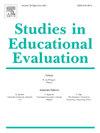大学管理的机器学习:微集群学习预测“活跃”学生
IF 2.6
2区 教育学
Q1 EDUCATION & EDUCATIONAL RESEARCH
引用次数: 0
摘要
大学的战略过程可以延续到未来几年,学生绩效预测是大学治理的一个重要方面。通过将机器学习和ARIMA模型混合应用于大学行政数据的微集群,提出了“微集群学习”。其目的是预测未来一到三个学年的表现指标,并将五年的结果与官方统计数据进行比较。生成微集群,并对每个集群应用20种机器学习算法。算法和它们的超参数设置是在一个探索性的人工预选过程中确定的。结果显示,与官方统计数据的偏差在未来一学年为2 %至8 % (SD = 6 %),两年为1-29 % (SD = 19 %),三年为1-17 % (SD = 11 %)。模型性能与微集群中细节的增加相关,并且在更大的微集群中表现更好。这种方法非常灵活,可以在世界各地的许多不同的大学环境中使用,也可以用于不同的结果,例如,成绩或学生状态。然而,这种灵活性伴随着繁琐的设置和非常长的运行时间。随着自动化程度的提高,未来的改进是必要的,应该开发“元过程”,可以在一堆算法上执行自动重采样和超参数调优。本研究提出的方法有助于不同国家和大学系统的预防性大学管理。本文章由计算机程序翻译,如有差异,请以英文原文为准。
Machine learning for university management: Micro Cluster Learning to predict "active" students
The strategy process of universities can span several years into the future with prediction of student performance being an important aspect for university governance. “Micro Cluster Learning” is proposed, by applying a hybrid of machine learning and ARIMA models to micro clusters of a university’s administrative data. The aim was to predict a performance indicator one to three academic years in the future and to compare the results of five years and to official statistics. Micro clusters were generated and a stack of 20 machine learning algorithms was applied to each cluster. The algorithms and their hyperparameter settings were determined in an explorative manual pre-selection process. The results show deviations from the official statistics between 2 % and 8 % (SD = 6 %) for one academic year in the future, 1–29 % (SD = 19 %) for two and 1–17 % (SD = 11 %) for three years. Model performance correlated with increasing details in the micro clusters and was better in larger micro clusters. The method is very flexible and can be used in a multitude of different university settings worldwide and for different outcomes of interest, e.g., grades or student status. However, the flexibility goes along with a tedious setup and very long runtimes. Future improvements with increased automation are warranted and “meta-procedures” should be developed that can perform automated resampling and hyperparameter tuning on a stack of algorithms. The method presented in this study contributes to preventive university management in different countries and university systems.
求助全文
通过发布文献求助,成功后即可免费获取论文全文。
去求助
来源期刊

Studies in Educational Evaluation
Multiple-
CiteScore
6.90
自引率
6.50%
发文量
90
审稿时长
62 days
期刊介绍:
Studies in Educational Evaluation publishes original reports of evaluation studies. Four types of articles are published by the journal: (a) Empirical evaluation studies representing evaluation practice in educational systems around the world; (b) Theoretical reflections and empirical studies related to issues involved in the evaluation of educational programs, educational institutions, educational personnel and student assessment; (c) Articles summarizing the state-of-the-art concerning specific topics in evaluation in general or in a particular country or group of countries; (d) Book reviews and brief abstracts of evaluation studies.
 求助内容:
求助内容: 应助结果提醒方式:
应助结果提醒方式:


